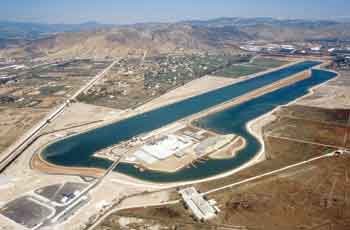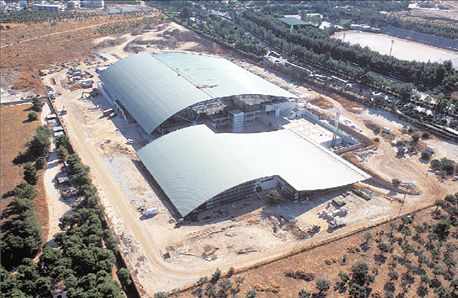The Olympic complex in Ano Liosia, picture: www.stadia.gr
Finance Minister Yiannis Stournaras told Parliament, in response to a question from Democratic Left MP Yiannis Panousis, regarding the utilisation of Olympic venues and the cost of the Olympics, that the proper use of public property is a priority of the government. According to Stournaras, Olympic venues are a very dynamic sector that will increase the advantages of the country, bring revenues to the state and create jobs, and their exploitation is orientated precisely in this direction. The Minister explained that Olympic venues are the responsibility of the State Property Company, as the following sites are under its guardianship:
 1. The Olympic Complex in Faliro
1. The Olympic Complex in Faliro
2. The Olympic Rowing Canal in Schinias
3. The Olympic Centre in Ano Liosia
4. Pantesaliko Stadium in Volos
5. The Olympic Hippodrome Markopoulou
6. Goudi Olympic Complex
7. The Olympic Shooting Range in Markopoulou
8. Nikaia Olympic Centre
9. The International Centre for Radio and Television
10. The Press Centre
11. The Olympic Centre in Galatsi
12. Pampeloponisiako Stadium in Patras
13. Pankritio Stadium in Heraklion

A lot of these are operated as concessions under long-term contracts, which means that maintenance costs are borne by the concessionaire. The State Property Company is responsible for the maintenance and operation of the first six Olympic sites on the list, as well as for Beach Volley and the sailing port of the complex in Faliro, which are also operated as concessions. The annual maintenance costs of these six sites amount to 1.1 million euro. Attempts have already been made for a lot of the Olympic properties to be operated as concessions. Furthermore, while a plan for their commercial exploitation is being prepared, some of them are given to other state institutions.
As for the cost of the Olympics, the total amount is estimated at 8.5 billion euro, including costs borne by the state (the budget and public investment programme) and the costs of the Organising Committee "Athens 2004". Of these, about 2 billion euro were covered by ticket sales, sponsors, television broadcasting rights, etc. Of the remaining 6.5 billion euro, 2 billion euro were spent on archaeological sites and hospitals - sites which are now also used by the public. Thus, the net cost of the Olympics amounts to 4.5 billion euro. It also includes public facilities such as the construction of the Olympic ring-road and reconstruction of the coastal zone of the Gulf of Faliro. The Olympics attracted a lot of tourists to Greece. The VAT on companies' activities during the Olympics alone raised 3.5 billion euro. In parallel, Greece became extremely popular. Therefore, if the cost-benefit ratio is analysed, the Greek economy is at a profit from the Olympics, according to Stournaras. The Minister added that, after the Olympics, Greece has been forgotten and the reason for this are all those who let the country enter into the major crisis, and not the Olympics.
The future operation of the Olympic venues is part of the general plan for the exploitation of public property. There must be a complete solution rather than multiple partial ones, which do not achieve the best possible results, both in terms of revenues and opportunities for investment and development. According to Stournaras, the political opposition interprets plans for the privatisation of state property as completely alienating the public from its property, but this is not the case. This usually happens when the public allows its property to go to ruin and be usurped, as revealed by negative publications in the foreign press, which were the reason for Panousis's question. The Minister of Finance said that these pictures of abandoned Olympic venues, as well as the spaces around them, are not appropriate for a country that is looking for new perspectives.
The organisation of the Olympic Games in 2004 was a significant event for the country. It created a lot of positive changes in the cityscape of Athens and other cities, and showed that Greece can act quickly, decisively and with impressive results. The post-Olympic exploitation of these sites is a complex issue for all countries that have organised Olympic games, even for those which had a detailed plan.